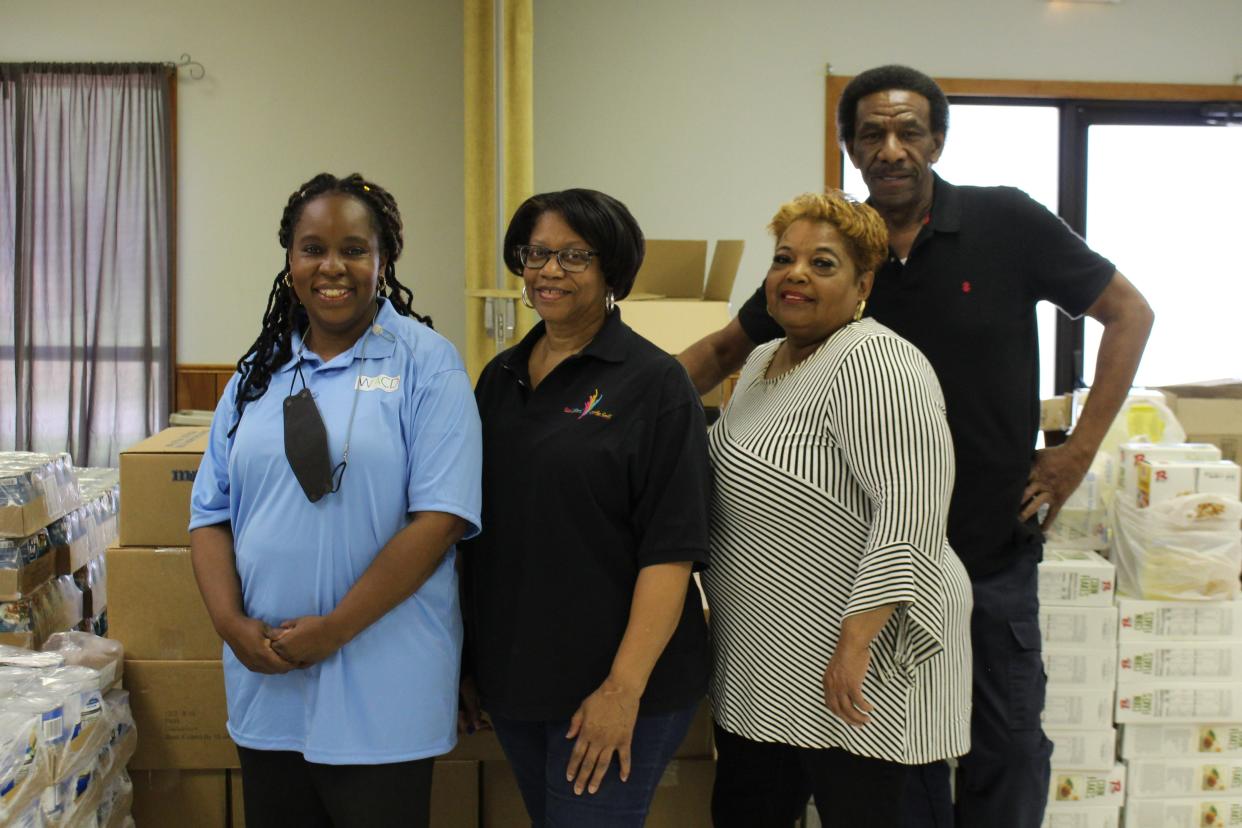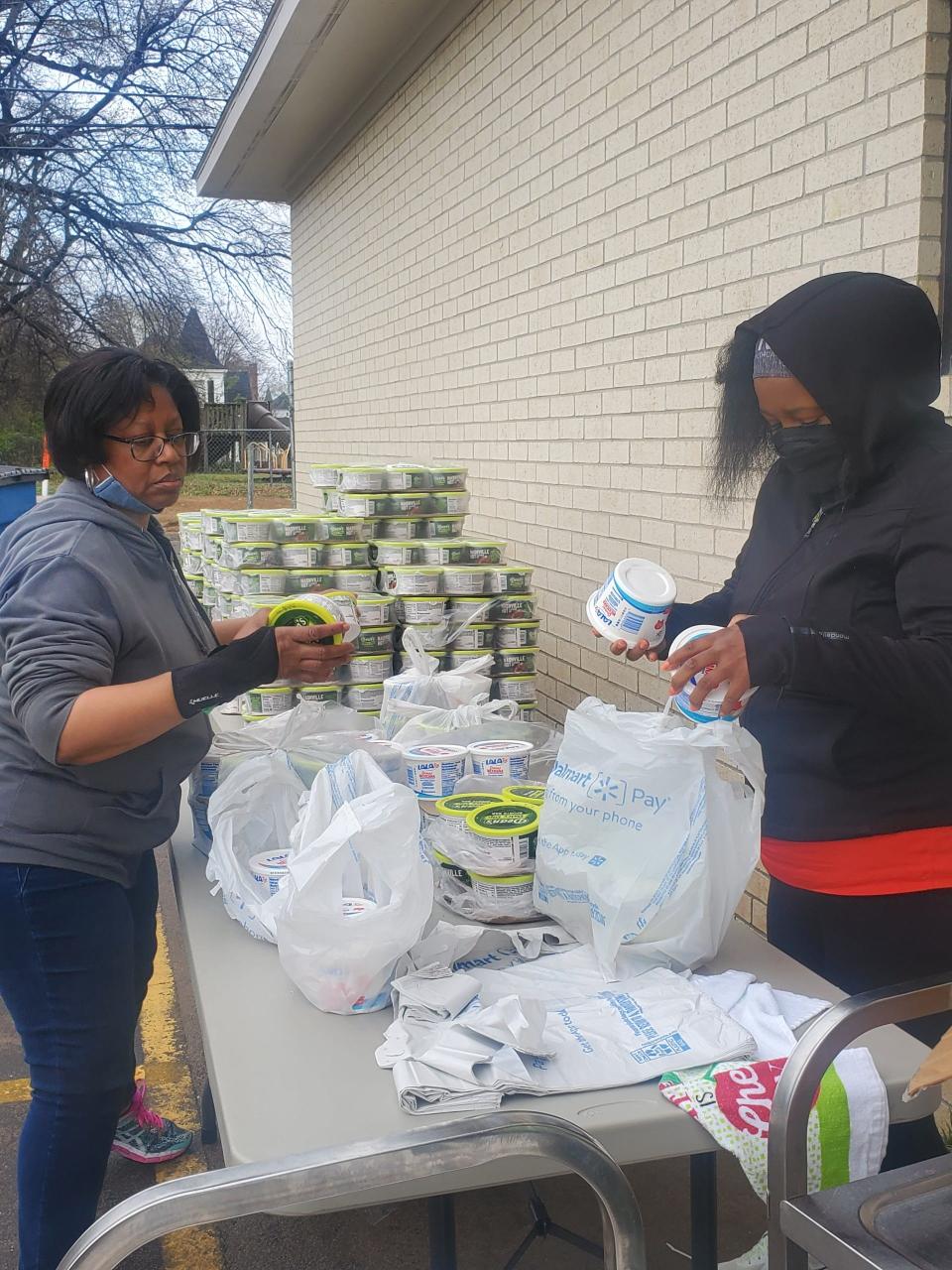Blessed to be a blessing: Mission UMC Food Pantry feeds hungry in Fort Smith

The Mission United Methodist Church volunteer team may be small, but they still move mountains.
Working in Fort Smith, where nearly one in five people live in poverty, the level of need can be overwhelming and disheartening. The volunteers at the Mission United Methodist Church Food Pantry have never backed down from this challenge.
“I think one of the things that we can do, which they do a great job here of doing that, is realize that hunger and poverty or struggle don’t take a vacation,” said LaToya Shepherd, the pastor and director of the food pantry at the church.
Any time the church building is open, people know that they can find help without judgment. Tina Gordon, a volunteer with the pantry, said this reputation draws in others as hope spreads by word of mouth.
“They tell other people, ‘You can go to Mission and be treated with respect, and they have a genuine concern for my wellbeing,’” Gordon said.
Mission United Methodist Church uses the blessings they receive to bless others in need.
“One of the challenges was moving all of this stuff,” Shepherd said, waving toward the pallets in the church’s fellowship hall. “… We were blessed to be able to buy a pallet jack yesterday … As a small church we don’t have a big truck or trailer or anything like that. We were blessed, we went down to the food bank … (and) someone else helped us to bring all of this in here.”
“We have challenges, but it doesn’t keep us from serving people,” she added.
River Valley partnerships
The church’s pantry operates on a hybrid model with a general food pantry and as a United States Department of Agriculture (USDA) commodities distribution site.
Food for the general pantry comes from community and church member donations and Western Arkansas Community Development.
The pantry joined the River Valley Regional Food Bank’s network that distributes USDA commodities earlier this month.
The commodities program provides a healthy diet through "a broad mix of fruits, vegetables, grains, dairy, and protein products” in its food boxes, according to the USDA.

Tracy Engel, director of the River Valley Regional Food Bank, said this partnership increases access to food for clients by expanding the USDA program in new areas of Fort Smith.
Engel said the food bank is grateful to have Mission United Methodist Church as a partner pantry because they are always ready to help. Before the first commodities distribution, Engel directed a man in need to Shepherd, who was able to immediately provide food.
“(Shepherd) went and knocked on that man’s door and hand-delivered that food to him,” Engel said. “That’s just the kind of partners we have at the food bank. They are our boots on the ground, but it just tells you (Shepherd’s) heart. She’s got a heart of gold.”
Serving working families
During the inaugural commodities distribution at Mission United Methodist Church April 2, more than 150 families were served.
Gordon said that during the event, “I had several people just actually break out in tears because they said if it hadn’t been that day, they wouldn’t have had anything to eat the rest of the day or any other part of the week.”
Hearing the stories of people with an invisible need like hunger can change a person’s perspective. Through her volunteer work, Gordon acknowledged the dangers of complacency.
“We become so complacent that we, who have never been hungry, take for granted that there are people out there who are genuinely hungry,” she said. “Because it was an eye-opener to me when I first started doing this.”
The need becomes visible through the lines of people waiting for assistance and the pallets of food sitting inside the church building.
“There are hungry people here in Fort Smith,” Gordon said. “Because you have single mothers raising three or four kids, making minimum wage, having to make a choice – do I pay my utility bill, or do I feed my children? If I pay my utility bill, the rest of the month I’m going to have to have some kind of help with snacks and just food for my children.”
Working families make these difficult decisions every day. Shepherd said one of the biggest misconceptions people have about food insecurity is that most people in need are not working.
“We see a lot of working people, a lot of working people,” she emphasized.
About 17.9% of people in Fort Smith lived below the poverty level in 2019 with nearly 40% of them working full- or part-time, according to the American Community Survey.
This percentage does not include families living on the edge of poverty, often referred to as “ALICE” households – Asset Limited, Income Constrained, Employed – meaning they make more than the federal poverty level but still are unable to meet their basic needs.
Gordon has a philosophy that people do not intentionally choose these difficult situations.
"Life happens, things happen,” she said. “… I always say we’re all one day, one paycheck away from being homeless or being hungry with the way society is now.”
As the church continues helping people who walk up to the building in search of food and assistance, Shepherd said the community needs to shift its understanding of poverty.
“I think that one of the things that the community can do to help people in poverty, hunger, who are struggling period, is realize that it’s a 24-hour thing,” she said.
Where to find help
For more information on the Mission United Methodist Church food pantry, call 479-222-6938.
The next USDA commodities distribution will be from 10 a.m. to 1 p.m., Saturday, May 21 at 721 North 10th St. in Fort Smith. You must be an Arkansas resident and only receive commodities at one location once a month.
This article originally appeared on Fort Smith Times Record: Mission UMC Food Pantry supports working families in Fort Smith

